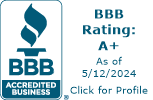Debt Consolidation Programs
No Credit Check Required
Consolidate your debt into one simple monthly payment without a loan, and gain financial stability with our Debt Consolidation Program.
Get a FREE Debt Consolidation Consultation
There is ZERO cost or obligation to you, and may improve your credit score over the duration of the program.
By clicking “Submit” I consent to receive calls and email message offers/information from Debt Reduction Services, Inc. using an autodialer/pre-recorded message at the number I provided. I understand that msg/data rates may apply and that my consent to such communications is not a requirement for purchase. If you would like to stop receiving text messages from DRS, simply reply to a received text with the word STOP. This site is protected by reCAPTCHA and the Google Privacy Policy and Terms of Service apply.
Call Now and Speak with one of Our Certified Credit Counselors for FREE to Learn About Your Debt Relief Options
Or, Find Out How Much You Can Save Right Now
Use Our Online Debt Consolidation Calculator to See How Much You Could Save with Our Debt Consolidation Program.
Just a Few of the Creditors We Can Negotiate with On Your Behalf
Debt Reduction Services’s program is not a loan that replaces your existing debts with a new one. We’re here to act as your advocate and negotiate with your creditors on your behalf.












Reduce your monthly payments up to 50% and pay off your debt faster.
We have already negotiated reduced interest rates with all major creditors and most regional and local lenders in order to assist you in repaying your debt sooner than you would be able to on your own. Often, we’re able to leverage our existing relationships to stop your late and over-limit fees, and even lower your required monthly payments.
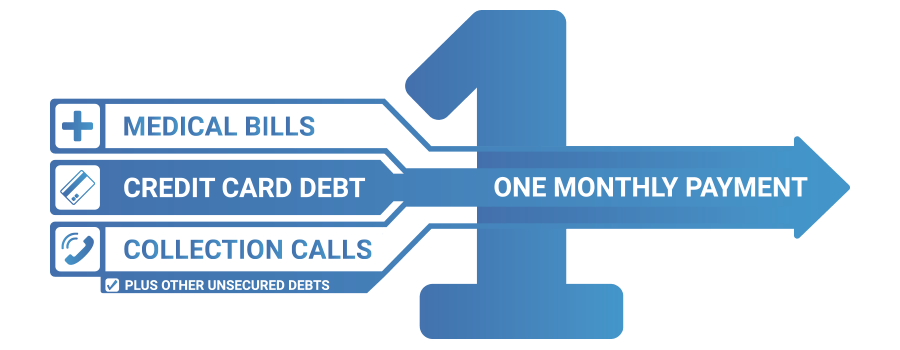
How it Works

Step 1.
Talk to one of our certified debt consolidation counselors.

Step 2.
Our preset terms with creditors can get you lower interest rates and payments.

Step 3.
Make just one simple monthly payment to us and we’ll distribute it to your creditors for you.
Reviews and Success Stories
When you’ve got more debt than you can keep up with, and you’re having a hard time making your monthly payments, a debt consolidation program can offer relief.
At Debt Reduction Services, we offer help for people struggling with credit card debt and other financial difficulties so that they can get back in control of their finances. Here you’ll learn all about debt consolidation programs, and how they work, so that you can decide if enrolling in one is right for you.
What is a Debt Consolidation Program?
Debt consolidation programs are services that involve a formal plan to restructure and pay off your debt by combining multiple accounts (primarily credit cards) into one single monthly payment. This typically involves a nonprofit company who manages the plan using predetermined benefits with your creditors. These benefits include things such as waived penalties and fees and/or a lower interest rates. You will then make a single monthly payment to the nonprofit company, who will distribute the funds to your original lender.
The primary goal is to help you eliminate your debt for good and to save you money in the process, after which all of your accounts would be reported as “paid-as-agreed.”
Differences between a Debt Consolidation Program and a Debt Consolidation Loan
While the two terms are often confused and interchanged, there is a significant difference between the two (you can learn even more about how debt consolidation works here).
A consolidation loan (as opposed to a program) is exactly that, a new loan that gets used to pay off other loans or forms of debt. A debt consolidation program however is a service which:
- offers lower interest rates and monthly minimums
- stops late and over-limit fees
- pays off the debts over time
They also differ in that a debt consolidation program is typically done through a nonprofit credit counseling agency and includes financial education (including how to budget) to ensure the client is empowered to make healthier decisions for financial stability long after they finish repaying their debts.

Aside from those main differences, there are also some similarities shared by programs and loans. These include making a single monthly payment instead of multiple payments, and likely having a lower monthly payment than you had before.
If you don’t know which is right for you, credit counseling can help. Credit counselors are certified professionals, who know these programs inside and out. They will walk you through your finances answering any questions, giving advice and finally making a recommendation based on the information you provide.
Debt Consolidation Loan
PROS
- Can obtain a lower interest rate on debt
- Pays off old debt
- Establishes new timeline and monthly payment
CONS
- Must meet credit qualifications for a loan
- Loan may not cover the amount of debt owed
- May come with a higher interest rate
- May not supply access to financial education
Debt Consolidation Program
PROS
- No minimum credit score requirement
- Obtain lower interest rates and reduce fees on debt
- Pays off all debt dollar for dollar
- Affordable monthly payments
- Free credit and debt counseling
- Fewer qualifications to meet than with a loan
CONS
- Total debt of less than $1,000 may be better paid on your own
- Cannot consolidate secured debts (i.e. house, car, etc.)
Types of Debt that Can Be Consolidated Using a Debt Consolidation Program
Debt consolidation (management) programs are intended to help people with their unsecured debts (debt that is not secured by collateral, i.e. a house or a car). Credit card debt is the most commonly addressed through a DMP. However, almost all types of unsecured debt can be addressed including past medical bills, debt in collections, personal or payday loans, and repossessions.
Mortgages, car loans, or home equity lines of credit are all secured debts and therefore cannot be enrolled in a debt consolidation program.
WHAT WE CAN CONSOLIDATE
Unsecured Debt Such As:
- Credit Card Debt
- Medical Bills
- Payday Loans
WHAT WE CAN’T CONSOLIDATE
Secured Debt Such As:
- Mortgages
- Home Equity Line of Credit
- Car & Title Loans
- Pawn Shop Loans
Will a Debt Consolidation Program Hurt Your Credit Score?
Participating in a DMP in order to consolidate your debt does not directly affect your credit score, but a temporary note may be made on your credit report by your current creditors. This simply informs other creditors of your attempt to repay your debt and discourages them from issuing you any new accounts, lines of credit, or loans that may detract from your efforts.
Once you have completed the program, this notation is required to be removed. In certain circumstances, when a client enrolls in our DMP and either they or their creditors’ close credit accounts, the client may see a short-term drop in credit score partly due to a change in the ratio of current balance to available credit limit. However, this dip is quickly recovered because of on-time payments which lower total debt owed.
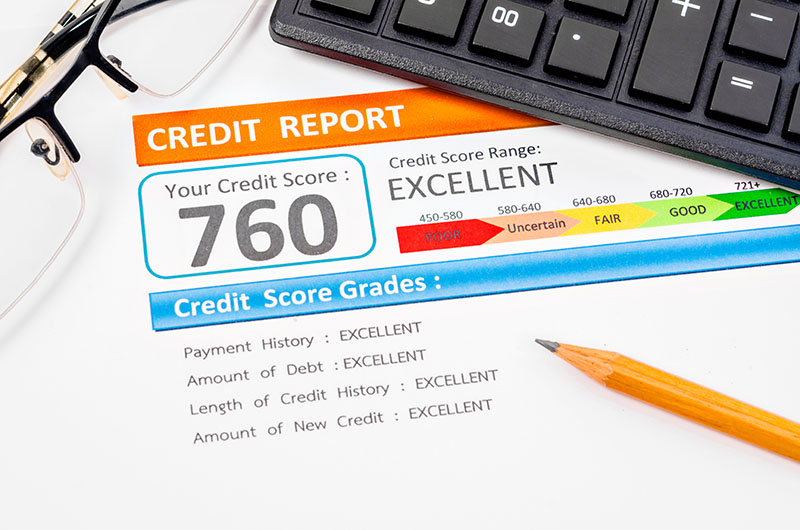
Advantages and Disadvantages of Debt Consolidation Programs
The primary benefits of a debt consolidation program is having your debts rolled into one monthly payment instead of having multiple bills and creditors to deal with.
Also, interest rates will typically be much lower than the various rates you were paying and a lower minimum to each creditor is offered.
A lower payment means you could potentially pay off your debt faster. Furthermore, consumers with severe credit card debt typically get a better interest rate from a program than with a consolidation loan.
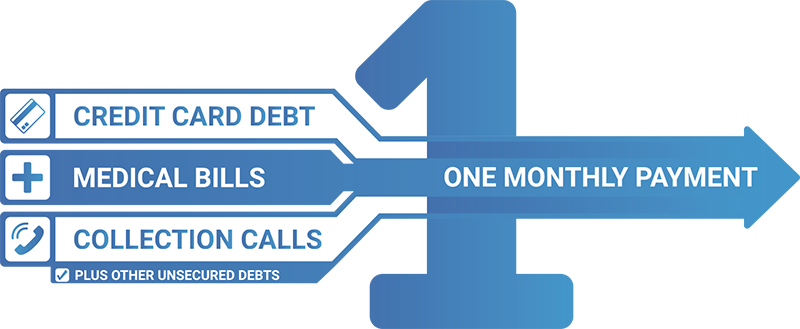
Another significant advantage is that unlike getting a consolidation loan, a DMP does not take your credit score into account when determining your eligibility.
This is because a debt consolidation program does not involve getting a new loan, so people who have been struggling to pay their current debt (and as a result may now have a bad credit score) can still qualify.
You can learn more about consolidating debt with bad credit here.
While there are significant advantages to enrolling in a debt management (consolidation) program, it’s important to note that there are typically fees involved with this service. It’s a good idea to compare fees among organizations before you pick one. When you’re struggling to make your monthly payments, those dollars matter.
Debt Consolidation Frequently Asked Questions (FAQs)
What type of debt can be included in debt consolidation?
Only unsecured debt can be included in a debt consolidation program. Unsecured debt is any type of debt not backed by collateral. For example, unsecured debt includes credit card debt, medical bills, and personal loans. Secured debt includes mortgage and car loans in which case, should a borrower be found incapable of repayment, assets can be repossessed or ceased.
What does your credit score need to be for a debt consolidation loan?
This can vary depending on the lender you choose. However, the better your credit score, the better the terms you will receive. If you suffer from a poor credit score, you may not be eligible for a debt consolidation loan, or the terms may not be favorable to your financial situation. A debt management plan is worth considering for those with bad credit, as your credit score is not considered when reviewing your application.
Is debt consolidation bad for my credit score?
Participating in a debt management program in order to consolidate your debt does not directly affect your credit score. A temporary note may be made on your credit report by your current creditors. This simply informs other creditors of your attempt to repay your debt and discourages them from issuing you any new accounts, lines of credit, or loans that may detract from your efforts.
Once you have completed the DMP, this notation is required to be removed. In certain circumstances, when a client enrolls in the DMP and either they or their creditors’ close credit accounts, the client may see a short-term drop in credit score partly due to a change in the ratio of current balance to available credit limit. However, this dip is quickly recovered because of on-time payments which lower debt owed.
Does debt consolidation work on a limited income?
Because qualifying for a loan is typically based in part on income, acquiring a consolidation loan could be difficult on a limited income.
However, consolidating debt through a debt management program requires no minimum income. Aside from a complete inability to pay, credit counseling agencies are willing to work with most incomes to create affordable payments and program participation.
Is consolidating debt a bad idea?
While lenders may be temporarily deterred from lending to someone who has consolidated debt because of closed accounts or credit report notations, these marks will fade, never lasting longer the repayment program itself.
Lenders then will be more willing to offer credit or loans due to increased credit scores. Many clients are even able to purchase homes shortly after completing their debt repayment.
Can you consolidate debt if it’s already in collections?
Yes, all unsecured debts can be included in a debt management plan. This includes unsecured debt that has been sent to collections.
With a debt consolidation loan, you can choose to use a portion of that loan towards debts that are already in collections. However, if the loan doesn’t cover all of your debt, you will need to be strategic in choosing what to pay off if you want to see a big benefit.
Are there free government debt consolidation programs?
No, the U.S. government does not offer a free debt consolidation program. In fact, they are not involved in any consumer debt consolidation programs.
The government will provide grants to nonprofit credit counseling agencies but only for very specific purposes: The US Department of Housing and Urban Development (HUD) may provide funding to nonprofit credit counseling agencies specifically for providing housing-related counseling and education.
The government does have programs to assist in student loan debt consolidation however. There are no grants for it, but the government allows borrowers to consolidate government direct loans (Direct, Stafford, Perkins, etc.). But that does not include any other type of debt.
Getting Started
Debt consolidation programs typically start by having a discussion with a certified credit counselor to determine whether enrolling is right for you. If you qualify for the program and decide to enroll, the DMP will take over the repayment of all your outstanding debts you choose to include. You can start right away after the file process is complete. This is usually done within 7 days.
Again, your debts will continue to exist where they are now. You’re not getting a new loan or moving the debt around, but now you’ll make just one monthly payment, and the funds will then be distributed to your various creditors. The company you choose for your debt consolidation program will then communicate with your creditors during the setup process and continue to do so as the program progresses.

About the Author
Author and Accredited Financial Counselor®, Todd R. Christensen, MIM, MA, is the Education Manager for Debt Reduction Services, a nationwide nonprofit financial wellness and credit counseling agency. Todd develops educational programs and produces materials that teach personal financial skills and responsibilities to all ages. He’s also the author of the book Everyday Money for Everyday People.


